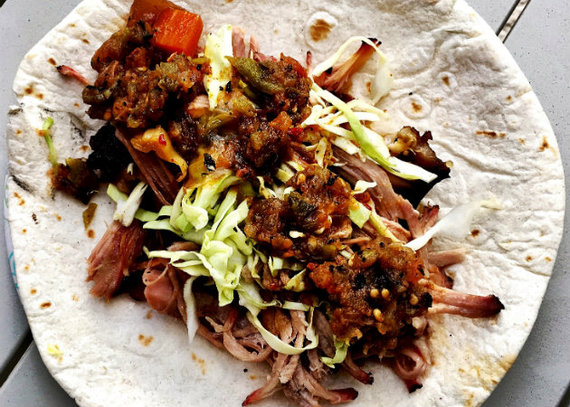Even baby boomers have a difficult time remembering when tacos--like pizza--weren't a ubiquitous part of the culinary landscape. (Glen Bell opened the first Taco Bell restaurant in 1962 and went public with his franchise in 1970.) Now, Americans eat more than 4.5 billion tacos a year. Tacos rank among our most beloved fast foods, good for breakfast, lunch, dinner, or a late-night snack after the bars close.
The anglicized tacos of our youth started with a boxed kit containing fragile U-shaped taco shells, salsa, and a packet of seasoning you added to sautéed crumbles of ground beef. (You also supplied shredded iceberg lettuce and yellow cheese.)
The real deal tacos in Mexico come as a revelation: small pliable fresh corn tortillas electrified with bright, freshly made salsas. Serve them Yucatan-style--filled with cochinita pibil (achiote-scented pulled pork). Or al carbon (charcoal-grilled skirt steak tacos) from Sonora. Or grilled fish tacos from Ensenada. Then there's the uber popular taco al pastor (shepherd's taco), made with thinly shaved chile-marinated spit-roasted pork and pineapple.
There is some controversy over the etymological origins of the word "taco." In his book Tacos (10-Speed Press, 2009), my pal Mark Miller, the chef-founder of the Coyote Café in Santa Fe, New Mexico, claims taco is a derivative of the Nahuatl word ac, meaning "flat."
Jeffrey M. Pilcher, a history professor who's studied tacos for over 20 years, ascertains in Smithsonian Magazine that tacos were named after the small hand-rolled paper and gunpowder explosives (taco is Spanish for "plug") Mexican silver miners used to break up rock faces. One of the first written references to tacos, he claims, was tacos de mineros ("miner's tacos"); it appeared in the late 19th century.
While the argument still rages south of the border over what tacos are authentically Mexican--they can't deny the influence of the conquistadors and immigrants from the Middle East--in North America we have reconciled ourselves to eating tacos with multinational influences. One of the most successful iterations has been Chef Roy Choi's Korean tacos, which he peddles from L.A.-based food trucks and a bricks and mortar location. Falafel tacos, Indian-influenced tacos, vegan and vegetarian tacos, Vietnamese banh mi tacos--it's all good.
SIGN UP for Steven Raichlen's UP IN SMOKE newsletter to learn more about barbecue!
--
Steven Raichlen is the author of the Barbecue! Bible cookbook series and the host of Project Smoke on public television. His web site is BarbecueBible.com.
